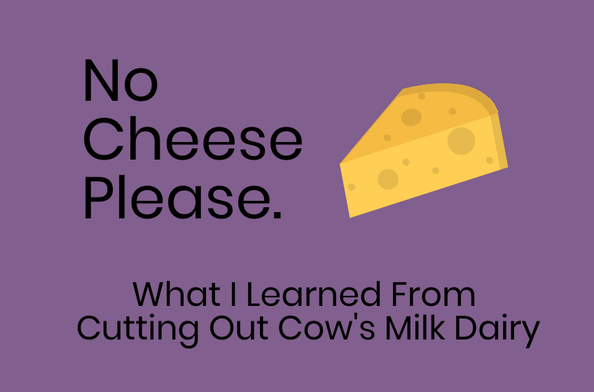|
NOTE: This is not a recommendation for you to cut dairy and I’m not saying that dairy is "bad".
It’s the trend these days to eliminate entire food groups. For some, the reasoning is sound. For many others, it’s “the thing” to do. I never imagined I’d willingly cut dairy from my life. I LOVE cheese, Greek yogurt, and ice cream but after reading What Dairy Does to Periods and an article about inflammation caused by A1 casein by Dr. Lara Briden, I wondered if I should consider it. It wasn’t the first time I’d come across information suggesting that some types of dairy may contribute to period pain. However, I found plenty of information and data supporting dairy intake as a healthy part of a well-rounded diet as well. For example, several studies have concluded that dairy products have anti-inflammatory properties in humans not suffering from allergy to milk. I am unaware of having a cow’s milk allergy, so where does that leave me? I wasn’t entirely convinced to give it a go…until my next period arrived. It was BAD. It’s gotten to the point that I’m a candidate for hysterectomy due to suspected adenomyosis. I knew that cutting out most dairy products would be difficult. But not as difficult as the painful cramping and bloating have been. What if I could make dietary changes and feel better? I want to eat foods that support my health and sense of well-being. I definitely don’t want eat foods that could potentially cause higher levels of physical pain. I weighed the pros and cons; it was time to try the cheese-free life.
2 Comments
Stress can be a good thing; it gives you that kick in the butt to perform well. Too much stress on the other hand will result in physical and mental manifestations. The on-going, negative, daily stresses that build up over time can have massive impacts on your quality of life. Unrealistic deadlines, “not your favorite” co-workers, traffic, arguments with a loved one, aging parents, childcare, illnesses or injuries, unexpected repairs, insomnia, watching the news = STRESS! Just reading that list made me feel it! We all have variable doses of stress throughout our lives and when it's not well-managed, it adds up. If we look at women with very similar situations and sources of stress, we’d still find differences in perceived stress levels and how each is affected by them.
How do you address your stress? Do you open a bottle of wine, grab some pizza, and complain to a friend? I’m not gonna lie, that sounds ideal when you're dealing with an unexpected rough patch. However, for ongoing day-to-day stress that is affecting your life, you've got to have some other strategies. Several forms of coping, such as reliance on alcohol, will eventually make you feel worse. And it matters because chronic stress can have a significant impact on your health and well-being. Chronic stress has been shown to have numerous effects on the body. Immune function, cardiovascular health, and gastrointestinal processes can be negatively impacted. Stress influences hormones which influence metabolism and appetite, leading to changes in weight and energy levels. Hormones also affect recovery rates from illness or injury, ability to sleep, mood, and more. Chronic stress can impact relationships at home and at work. According to the American Psychological Association Stress Survey in 2014, 48% of those polled said stress had a negative impact on their personal and professional lives. Social support increases chances of succeeding in exercise and healthful eating efforts. It follows that if relationships are strained, it will be harder to find dependable social support. When under chronic stress that is continually pushed down or ignored, it will likely manifest in changes to your health, energy, mood, and/or relationships. That's kind of a big deal! If you are working on improving dietary and exercise habits but you don’t address chronic stress, you aren’t likely to get very far. Even if exercise itself helps; addressing stress is an essential part of a comprehensive fitness plan. |
Archives
June 2023
Categories
All
|


 RSS Feed
RSS Feed